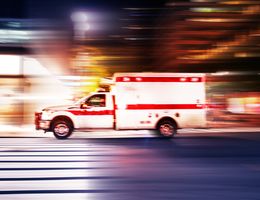Health library
Back to health libraryStroke: Know the signs, act FAST

Immediate treatment is the best way to prevent permanent disability and death from stroke.
As the control center for every system, organ and tissue in your body, your brain is perhaps the most vital of all vital organs. And a stroke, or brain attack, is one of the most dangerous things that can ever happen to it.
Strokes occur when blood supply to the brain is cut off, either by a blockage or because of a blood vessel that has burst open. During a stroke, precious brain tissue is starved of the oxygen and nutrients it needs to survive. The longer the tissue goes without blood, the greater the risk for permanent brain damage and death.
Act FAST
Stroke symptoms happen suddenly. To help people recognize them and act quickly, the American Stroke Association (ASA) encourages everyone to learn the acronym FAST. It stands for:
Face drooping or numbness. Does one side of the face droop? Ask the person to smile.
Arm weakness or numbness. Have the person raise both arms. Does one drift downward?
Speech difficulty. A person having a stroke may have slurred speech or be unable to speak.
Time to call 911. If you notice any stroke symptoms in yourself or someone else, call 911 right away.
According to the ASA, it's also important to know the following symptoms, which also come on suddenly:
- Numbness or weakness in a leg.
- Confusion or trouble understanding speech.
- Trouble seeing in one or both eyes.
- Trouble walking, dizziness, or loss of balance or coordination.
- Severe headache with no obvious cause.
Though it may seem like these signs would be difficult to miss, people may not realize they're having a stroke, according to the National Institute of Neurological Disorders and Stroke, and denial is common. So if you see signs of stroke in someone else, insist on calling 911 right away, even if the person claims to be fine.
It's also important to call for help even if stroke symptoms go away. Symptoms that go away could be due to a transient ischemic attack. Also called warning strokes, these attacks may mean that a major stroke is on the way.
What to do now
As with many medical problems, the best treatment for stroke is prevention. Don't smoke, and if you have high blood pressure, heart disease, diabetes or high cholesterol, get treatment.
Reviewed 12/1/2025
